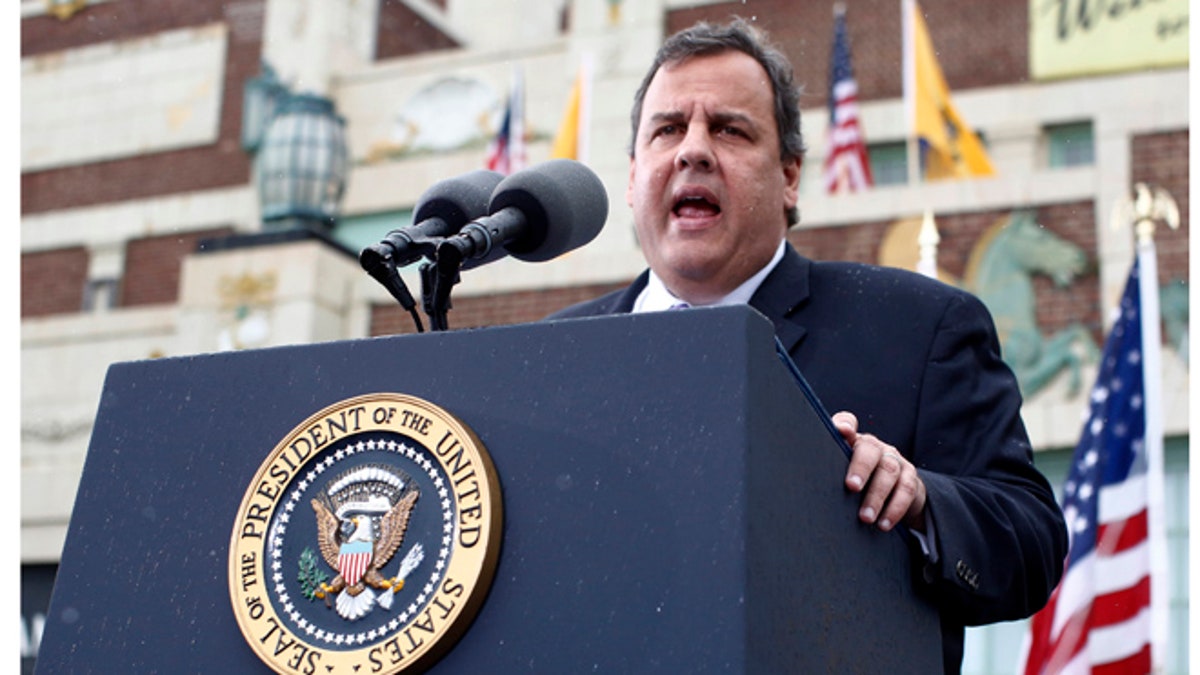
FILE: May 28, 2013: New Jersey Gov. Chris Christie introduces President Obama from the presidential lectern at Asbury Park, in New Jersey. (REUTERS)
New Jersey Gov. Chris Christie’s handling of Superstorm Sandy helped him burnish his bipartisan image as a no-nonsense problem-solver, and he’s riding high in the polls ahead of next week’s election.
But the tough-talking governor’s Sandy efforts, particularly his warm welcome of President Obama in aftermath of the October 2012 storm, still pose a challenge should he join the 2016 presidential race and face the expected field of conservative GOP primary candidates.
Republicans largely agree that Christie was simply doing his job by walking with Obama along storm-battered streets, though GOP presidential nominee Mitt Romney was struggling in the final days of his failed 2012 White House bid.
His arm-twisting, though, of Washington Republicans to get emergency funds appears to be the largest, lingering concern.
“Gimme, gimme, gimme -- give me all my Sandy money,” Kentucky Sen. Rand Paul, a top potential 2016 candidate, said over the summer, mocking the likes of Christie and New York lawmakers, also pounded by the storm.
Rutgers public policy professor Cliff Zukin says Christie’s Sandy efforts reinforced his standing among rank-and-file Republicans through “visibility in a crisis setting,” but they will probably hurt him among conservative Republican Party leaders.
“Many … were very upset he ‘helped’ Obama given the proximity of Sandy to the national election,” Zukin told FoxNews.com.
Christie indeed put the national spotlight on New Jersey recovery efforts, as New York residents in the Queens and State Island boroughs pleaded for more federal emergency help. However, any hard feelings now appear to be replaced by a mutual concern about unfulfilled promises and miles of federal red tape.
Sen. Tom Coburn, R-Okla., in a letter released Friday, complained that of the $60 billion aid package, federal agencies have only obligated $11 billion – and spent just $5 billion. New York has actually spent more than New Jersey of what relatively little money has gone out.
But Christie arguably has been the most out-in-front and vocal advocate for post-Sandy assistance.
In the aftermath of the 2012 election, Doug Gross, an Iowa Republican involved in at least two GOP presidential campaigns in that state, suggested to a reporter that party members could no longer trust Christie and wouldn’t forget what he did.
One year later, Gross said the issue remains, but he thinks Christie can move ahead.
“It’s still there for some people,” he told FoxNews.com. “Christie will have to overcome it, but I think he’ll be able to.”
The storm killed more than 100 people and caused at least $65 billion in damage. In the days between when the storm hit and the election, Christie publicly backed Romney and argued he was just doing his job.
However, the governor appeared two months later to blow some of the political currency he might have recouped among conservatives by blasting House Speaker John Boehner for holding up a $50.5 billion Sandy relief package.
Christie argued House leaders were playing political games while “innocent people” suffered, as fiscal conservatives objected to the legislation being “packed” with such unrelated spending as help for commercial fisheries in American Samoa and roof repairs for Smithsonian museums.
Sal Russo, founder of the national Tea Party Express, thinks most voters will move on.
“It’s probably too early to judge,” he said last week. “But one truism in politics is that things change so rapidly. I don’t think voters will really think about [last month’s] government shutdown by 2014. Christie did what he had to do.”
There is no doubt Christie is politically popular in New Jersey, which is not exactly a red state. He has at least a 26-point lead in major polls in his bid to win a second term.
He is also among the top potential 2016 GOP presidential candidates in every major poll. However, a closer look reveals what political analysts have repeatedly said: The so-called “Northeast Republican” would face serious competition in a primary, especially with Tea Party favorites like Sen. Ted Cruz, R-Texas, Sen. Marco Rubio, R-Fla., and Paul.
When Tea Party voters were asked who they’d pick if the election were held today, 22 percent said Paul, 20 percent said Cruz and 2 percent said Christie, according to the results of a Quinnipiac poll released this month.
Russo says the Tea Party’s objective is to end both political parties’ excessive spending and that Cruz and Paul have had a larger political stage than Christie to further that cause.
“It’s probably premature to judge right now,” he said.
Joe Desilets, of Harden Global, a Republican consulting firm, thinks “nobody will care that Governor Christie put his job before politics in the aftermath of Sandy,” by the time the 2016 presidential race is in full swing,
“In the end, Christie's bipartisan work may help him some in a general election, but it will likely have no impact on a primary contest since the Garden State governor already has a reputation for avoiding the political games many other would-be’s live for.”
Brian Baker, president of the nonprofit Ending Spending, said the goal is to pick the most conservative candidate “who can win the general election.”
“People will have to look at [Christie's] record and see if he’s governing as a fiscal conservative,” he said. “In my view, he did, even though it happened in the middle of a presidential election."
The Federal Emergency Management Agency has approved more than $1 billion in assistance to New Yorkers whose property was damaged or destroyed -- including roughly $855 million in home repairs and temporary rental costs and nearly $145 million in other uninsured expenses such as medical, moving and funeral costs.
More than 50,000 New York city families reportedly still need FEMA housing assistance, including hundreds still displaced or in need of major repairs. A FEMA spokesman told FoxNew.com last week the agency is updating its numbers but has been slowed by the recent partial government shutdown and will release a report soon.
“We still have quite a lot to do,” Linda Baran, president of the State Island Chamber of Commerce, said last week. “People I’ve talked to don’t really think the feds saved the day. They said the process has been complex and difficult, with many back up and running on their own perseverance.”




